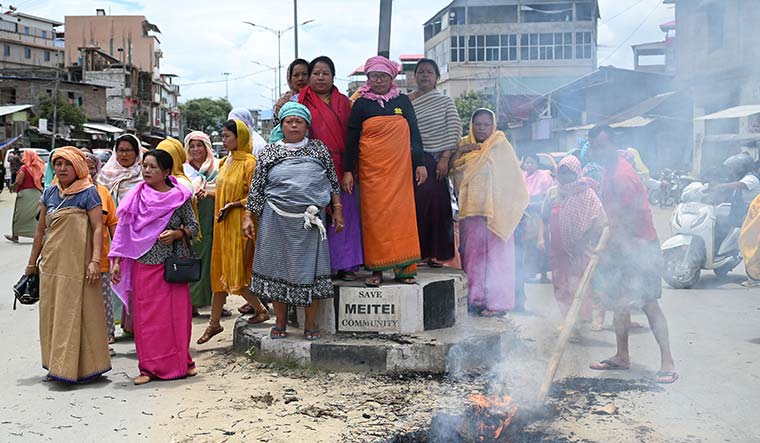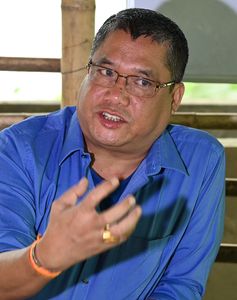A large section of the Meitei community regards M. Pramot Singh―chief of Meitei Leepun, a radical cultural organisation―as a hero and a philosopher. He has influenced the Meitei youth with the finesse of a Pied Piper. His supporters guard him diligently at his resort-like office atop the Meitei Langhol hill in Imphal. He keeps a loaded gun nearby; occasionally, he gives instructions to his people through a wireless set.
Singh is one of the most controversial figures in Manipur as Kukis accuse him of instigating violence. They say his cadres are embedded with the Manipur police. Many also raise concerns about his proximity to Chief Minister N. Biren Singh.
Meitei Leepun has amassed a large following, and many of its members are armed. Singh says over a thousand members of his group are trained in handling arms; he calls them “lallois,” a term derived from Manipur’s warrior culture. “We have more than a thousand lallois and around 14,000 paojellois in Imphal. Paojellois serve as evangelists, spreading my message far and wide. Their numbers are increasing by the day,” he says.
In an exclusive interview with THE WEEK, Singh says the Meiteis are the true indigenous people of Manipur and that the ongoing war is unavoidable.
Excerpts:
Q/ How can you justify the war when women are being stripped naked, paraded and raped?
A/ As I mentioned, when dialogue and the Army’s efforts fail to protect us, we, the Meiteis, are left with no choice, but to defend ourselves. Our village defence volunteers are safeguarding our land. However, in times of war, many incidents can occur, and being new to this, people are now learning from their experiences, understanding the dos and don’ts. The recent incident―the viral video of two women being stripped and paraded―served as a wake-up call. It made us realise the importance of proper training before engaging in a conflict. We are having internal discussions, recognising that our society is complex and advanced, with a rich civilisation. What happened goes against Meitei values and principles.
Q/ In an earlier interview you said you were well aware of a possible attack. Was the Meitei Leepun getting ready for a fight?
A/ I do not lie, and when I need to, I prefer to remain silent. Being well-connected, I have friends from all communities, including Kuki groups. Some Kuki groups, dissatisfied with their general style of functioning, have informed me about their plans. Many Kuki organisations are not supporting the Kuki militant-driven agenda. They disclosed that on May 3, under the pretext of a tribal solidarity march, certain Kuki groups were targeting Meitei houses, and that was when the violence began. Despite these circumstances, I still receive calls from my Kuki friends.
Q/ Why are you so angry with the Kuki people? What are the Meitei Leepun’s objectives?
A/ Manipur is an idea that embodies oneness in diversity. We are a welcoming community, which is why Kukis, who are not natural inhabitants of Manipur, have settled here. However, our main concern is that the Chin Kukis are still crossing the India-Myanmar border, moving to the hills, and later infiltrating the valley. The border has been neglected, allowing people to cross freely, leading to lawlessness in the area. Kuki militants are extorting people, and both the government and the Army have failed to stop this illegal migration and address related issues.
We, the Meiteis, consider ourselves warriors, following in the footsteps of our forefathers who protected our land for thousands of years. It is our duty to uphold our age-old tradition and reintroduce the lallup-kaba system (it required Meitei men to work in distant lands or the army), which the British abolished, calling it forced labour. This system is now embraced as a means to safeguard our land. We, the Meitei Leepun, stand united as a movement for this cause.
Q/ Kuki organisations are accusing Chief Minister Biren Singh of having a role in the ethnic clash.
A/ When the nation gained independence, we, the Meiteis, were not adequately prepared to embrace a democratic system, and we were under the illusion of ruling our territory. Biren Singh opened our eyes to reality. He took stringent action against forest encroachment and poppy cultivation, and also started addressing the issue of illegal immigration by considering the introduction of the National Register of Citizens (NRC). This has made the Kukis feel unsafe for the first time. They became fearful and planned the riot. It is our duty to support Biren as he works for the betterment of Manipur. Being an elected leader, we should allow him to lead us.
Q/ Some say the RSS is involved in radicalising the Meitei community.
A/ The RSS is a nationalist movement. We, too, are committed to the integrity of the nation. Our work is aligned with the idea of India and nationalism, but it does not imply that we are affiliated with the RSS.
Q/ Kukis demand separate administration, saying it is unsafe to live with Meiteis.
A/ Kukis were brought by the British, and now their population is increasing. Over the years, they gained dominance in Manipur’s hills, displacing Nepalis and, later, pushing out Meiteis. Consequently, we, the Meiteis, have become refugees in our own land. The older Kukis arrived just a hundred years back, yet they audaciously claim to be indigenous people. We, the Meiteis, are the true indigenous people of Manipur, and the Kuki communities have no right to demand anything. And I am telling you, they will see what we do.
Q/ After three months of ethnic clashes, we are witnessing widespread human suffering and opposition parties are highlighting the government’s failure.
A/ Over the years, mainland India, including the media, has fallen into a trap regarding northeast India. The prevailing belief is that to stand with the people, one needs to be anti-establishment. This narrative has persisted for several decades, but it is time to change the outlook towards this region.



